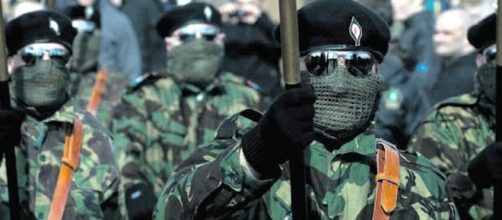Terrorism was a central theme of the 2016 presidential race and the Republican candidate #Donald Trump promised that he would get tough on terrorists. When he entered the Oval Office he then signed the contested ban on illegal immigration and ordered a raid on a terrorist target in Yemen that resulted in the death of naval SEAL William “Ryan Owens”. Yet in the anti terrorist rhetoric he concentrated only on the Islamists and forgot that terrorism has many faces and not just Islamic.
Reminders
This week BBC News gave us reminders of two tragic periods of recent history marked by terrorism.
The first example has religion as its root cause and the second was freedom for an ethnic group that considers itself a prisoner of a colonial power.
Both the examples no longer dominate the world’s headlines as they once did but they are useful reminders that terrorism has many faces and that is had been with us in many countries and for longer than many remember.
Northern Ireland
The problem of terrorism in Northern Ireland is a matter of religion but not Islam. What we now call terrorism was part of the process that led to the independence of the Republic Of Ireland and terrorism created the period known as the “Troubles” in Northern Ireland with the open warfare between the Catholic minority and the majority “Loyalist” Protestants.
This period seemed to have ended but the Brexit vote and a murder this week may well bring be the harbingers of another period of instability in troubled Ulster.
This week high profile Loyalist George Gilmore was murdered by masked men in Carrickfergus, County Antrim Northern Ireland. It is believed that the murder was due to a feud between loyalist groups in the region. Two men have been charged with the murder and will face court in Belfast on Saturday.
The use of masks was a normal part of terrorist attacks in the region by both Catholics and Protestants and the attack is a strong hint that the fear of the Troubles never totally expired.
This week also saw the approval of the law beginning the British Exit from the European Union after last June’s Brexit plebiscite.
This is a strange coincidence as there are now fears that one of the consequences of the vote will be renewed pressure for the region to merge with the neighbouring Catholic majority Republic of Ireland.
Although it is as yet too early to predict with precision, this region may well see a return to a period of armed struggle between the two Christian groups.
Spain
The other news item this week about terrorism came from Spain with the announcement that the Basque separatist group ETA will hand over its remaining weapons on April 8th. The Basque region has its own language and culture and considers itself separate from Castilian dominated Spain.
ETA was created after the crackdown of non “Spanish” groups by former Dictator General Francisco Franco suppressed the teaching and use of the Basque language and also of Catalan in that region.
The forty years of revolt against Madrid by ETA caused over 800 deaths from assassination and bombings.
Although ETA declared a ceasefire in 2011 this has not stopped the arrest of members and the seizure of weapons stashes by the Spanish government since then.
Only time will tell if the April 8th will signal an end to this period of violence or is only a transitory phase in the armed struggle by separatists.
Future
These items are only two examples of non Islamic terrorism and they are not isolated cases. The threat of terrorism has many faces and many religions. The solution to these threats is not religious or military but political and it requires a will to face up to responsibilities that up till now have been lacking on the world stage.
It takes little for old problems to flare once more and concentrating on only one group of terrorists only encourages others to take the same road to resolve their own causes. Too many have died for these causes and it is time that the world’s Leaders truly play a role in solving them.

